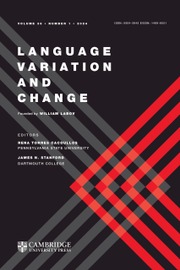Article contents
New insights into an old form: A variationist analysis of the pleonastic possessive in Guatemalan Spanish
Published online by Cambridge University Press: 25 July 2017
Abstract
Romance languages differ as regards the adjectival or article-like status of prenominal possessives. While in Italian, Portuguese, Catalan, and Old Spanish, they pattern like adjectives and co-occur with articles, and in French and Modern Spanish, they compete with the latter for the same structural position. The different distribution of possessives is claimed to reflect distinct stages on a grammaticalization cline (Alexiadou, 2004). This paper focuses on a variety of Central American Spanish where the Old Spanish co-occurrence of an (indefinite) article and a possessive in the prenominal domain has been maintained (as in una mi amiga ‘a my friend’). Based on a variationist study of interview data extracted from the Project for the Sociolinguistic Study of Spanish for Spain and America (PRESEEA) Guatemala corpus, I will argue that it is indeed the indefinite article that shows signs of retarded grammaticalization. Yet, rather than extending to the variety as a whole, this retardation is context-specific.
- Type
- Research Article
- Information
- Copyright
- Copyright © Cambridge University Press 2017
References
REFERENCES
- 2
- Cited by



